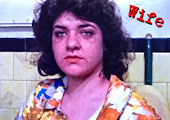1). Whoever designed the vet’s hideous apartment should have been given an Academy Award for Best Production Design. It’s the most depressing-looking urban living environment I’ve seen on film.
2). Filmmaker Buddy Giovinazzo cleverly ripped off David Lynch’s domestic arrangement from Eraserhead. The ugly apartment, ugly wife, ugly crying baby (also needing a constantly running vaporizer) are essentially the same, just set in different nightmare worlds.
Released in 1986, the same year as Platoon, there can be no mistake as to which film is authentically anti-war. Platoon is usually mislabeled as anti-war, but its poetic, romanticized view of combat neutralizes any anti-war sentiment, indeed, it probably inspired a lot of unemployed dopes to join the army. I guarantee nobody who sees Combat Shock will be running off to enlist.
That’s not to say Combat Shock is a better movie. I doubt many in our current age will have the patience to sit through this ultra low budget production with its amateurish acting and thin script. Indeed, to call it a *script* might be overly generous, as that would imply it was written. This thing was probably scrawled in red crayon by somebody on suicide watch in a psychiatric hospital.
Combat Shock might be the most depressing movie ever filmed. Nightmares, poverty, illness, family dysfunction, government dysfunction, addiction, crime, violence, death, that’s the plot synopsis. There are probably only three smiles in the entire movie, which occur during the film’s final third, when the filmmaker’s primary influence seems to switch from Eraserhead David Lynch to Paul Schrader/Martin Scorcese Taxi Driver, complete with a child prostitute that Frankie tries to help. Other than that brief moment, the rest of Combat Shock is a bleak, hopeless death march to its grim conclusion.
It’s an ugly-looking film with a thin, predictable plot that is as subtle as a sledgehammer. But, if you appreciate Art Brut, outsider art presenting the raw, authentic, personal expression of a creator uninterested in following the artistic herd, you will admire Combat Shock, particularly if you have a pessimistic world view.Consider this ten second clip:
I’ve never seen poverty so quickly, effectively and genuinely presented in film. These type of small moments bubble up in the grotesque ragout that is Combat Shock and earn it a rank of Five Stars for its complete lack of pretense and its ardent nihilism. It’s a brutal cinematic smelling salt in the somnolent celluloid Platoon/Saving Private Ryan war movie world.





No comments:
Post a Comment